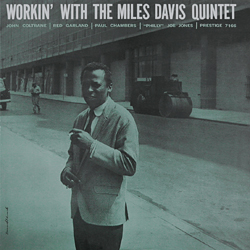
Workin' with the Miles Davis Quintet is an album by the Miles Davis Quintet which was released c. January 1960 through Prestige Records. It was recorded in two sessions on May 11 and October 26, 1956, that produced four albums: this one, Relaxin' with the Miles Davis Quintet, Steamin' with the Miles Davis Quintet and Cookin' with the Miles Davis Quintet.

Blue Haze is a compilation album of tracks recorded in 1953 and 1954 by Miles Davis for Prestige Records.

Miles Davis and the Modern Jazz Giants is an album by Miles Davis, released on Prestige Records in 1959. Most of the material comes from a session on December 24, 1954, featuring Thelonious Monk and Milt Jackson, and had been previously released in the discontinued ten inch LP format. "Swing Spring" was originally released on the 10"LP Miles Davis All Stars, Volume 1, and "Bemsha Swing" and "The Man I Love" had been previously released on Volume 2. "'Round Midnight" is newly released, and comes from the same sessions by Davis's new quintet in 1956 which resulted in Steamin' with the Miles Davis Quintet and three other albums to fulfill Davis's contract with Prestige.

Bags' Groove is a jazz album by Miles Davis, released in 1957 by Prestige, compiling material from two 10" LPs recorded in 1954, plus two alternative takes.

Miles Davis and Milt Jackson Quintet/Sextet, also known as Quintet/Sextet is a studio album by the trumpeter Miles Davis and vibraphonist Milt Jackson released by Prestige Records in August 1956. It was recorded on August 5, 1955. Credited to "Miles Davis and Milt Jackson", this was an "all-star" session, and did not feature any of the members of Davis's working group of that time. Alto saxophonist Jackie McLean appears on his own compositions “Dr. Jackle” and “Minor March”.
"Airegin" is a jazz standard composed by American jazz saxophonist Sonny Rollins in 1954. Rollins chose the name "Airegin", as it is an anadrome of "Nigeria".
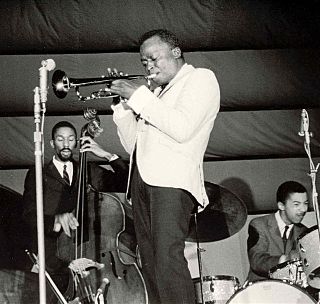
The Miles Davis Quintet was an American jazz band from 1955 to early 1969 led by Miles Davis. The quintet underwent frequent personnel changes toward its metamorphosis into a different ensemble in 1969. Most references pertain to two distinct and relatively stable bands: the First Great Quintet from 1955 to 1958, and the Second Great Quintet from late 1964 to early 1969, Davis being the only constant throughout.

Conception is a compilation album issued by Prestige Records in 1956 as PRLP 7013, featuring Miles Davis on a number of tracks. The album, compiled from earlier 10 inch LPs, or as 78rpm singles, also features musicians such as Lee Konitz, Sonny Rollins, Stan Getz, Gerry Mulligan, and Zoot Sims. The cover was designed by Bob Parent. In particular, the entirety of the 10"LP Lee Konitz: The New Sounds makes up all of side 1.

Blue Period is the third studio album by jazz musician Miles Davis. It was released in 1953 as a 10" LP, his second released by Prestige Records, recorded over the course of two 1951 recording sessions at New York's Apex Studio.
Dave Schildkraut was an American jazz alto saxophonist.

Miles Davis and Horns is a compilation album by the American jazz trumpeter Miles Davis. Released in 1956, by Prestige Records, it compiles material from albums previously released by Prestige in the discontinued 10 inch LP format. The fifth, sixth, and eighth tracks were originally issued on the various artists album Modern Jazz Trumpets, and had also been issued as 78rpm singles. Tracks 1–4 first appeared on Miles Davis Plays The Compositions Of Al Cohn. Track 3 was also previously released as the B-side of the "Morpheus" single. Track 7 was originally on Blue Period.

Monk is a 1956 compilation album by jazz pianist and composer Thelonious Monk, featuring material recorded from 1953 to 1954 for the Prestige label and performed by Monk with two quintets, one featuring Julius Watkins, Sonny Rollins, Percy Heath, and Willie Jones and one featuring Ray Copeland, Frank Foster, Curly Russell, and Art Blakey. It was originally titled both Thelonious Monk [on its 1956 cover] and Thelonious Monk Quintets [on its labels]. Over the following decade, it was also re-released as Wee See and The Golden Monk The most common cover art, is 1958 revision, designed by Reid Miles.

Thelonious Monk and Sonny Rollins is a compilation album by jazz pianist and composer Thelonious Monk and saxophonist Sonny Rollins released in 1956 by Prestige Records. The tracks on it were recorded in three sessions between 1953 and 1954. While this is its original title, and its most consistent title in its digital re-releases, it was also released on Prestige as Work! and The Genius Of Thelonious Monk, with alternative covers.

The New Sounds is the debut solo studio album by the American jazz musician Miles Davis. Released in late 1951 as a 10-inch LP, it is his first album as a bandleader and his first full album for Prestige Records. Davis had previously contributed three tracks to the Prestige compilation LP Modern Jazz Trumpets and appeared as a sideman on the 10-inch LP Lee Konitz: The New Sounds.

Miles Davis Quartet is a 10 inch LP album by Miles Davis, released in 1954 by Prestige Records. The first four tracks that comprise Side 1 were recorded at New York's WOR Studios, on May 19, 1953. The last three, heard on Side 2, were recorded nearly a year later, at New York's Beltone Studios, on March 15, 1954.
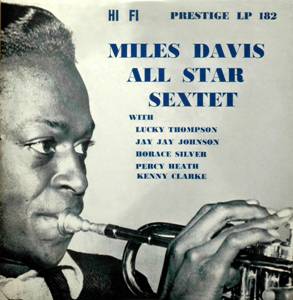
Miles Davis All Star Sextet is a 10 inch LP album by Miles Davis, released in 1954 by Prestige Records. The two side-long tracks were recorded at Rudy Van Gelder's Studio, Hackensack, New Jersey, April 29, 1954.
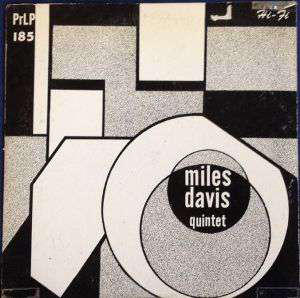
Miles Davis Quintet is a 10 inch LP album by Miles Davis, released in 1954 by Prestige Records. The album title is not to be confused with either of Davis' later Great Quintets. The three tracks on this LP, and one other, were recorded at Rudy Van Gelder's Studio, Hackensack, New Jersey, on April 3, 1954. This was the first session for Prestige Davis recorded at Gelder's home studio, as he would all his remaining sessions for the label.
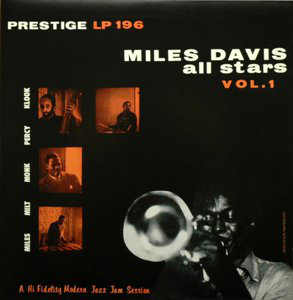
Miles Davis All Stars, Vols. 1 & 2 are a pair of separate but related 10" LP albums by Miles Davis recorded by Rudy Van Gelder on December 24, 1954 and released on Prestige Records as Miles Davis All Stars, Vol. 1 and Miles Davis All Stars, Vol. 2 the following year.

Modern Jazz Trumpets is an album released by Prestige Records in 1951 with music by four jazz trumpeters: Fats Navarro, Dizzy Gillespie, Miles Davis and Kenny Dorham. The album was released on the 10" LP format and includes the first recordings by Davis for Prestige.

The Brothers is a studio compilation album by American saxophonists Stan Getz and Zoot Sims released in 1956 via Prestige label.

















